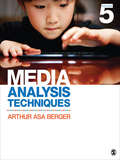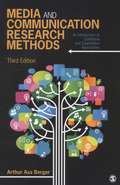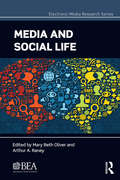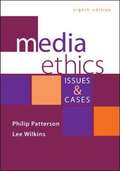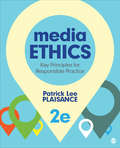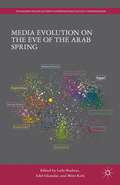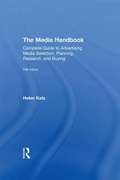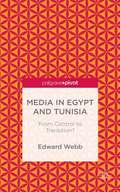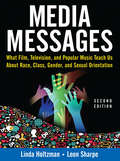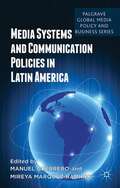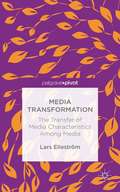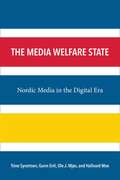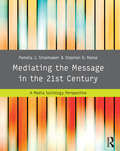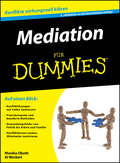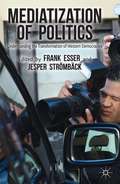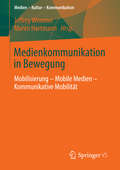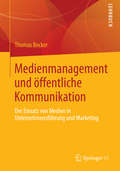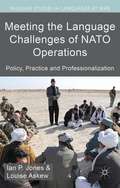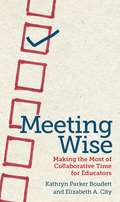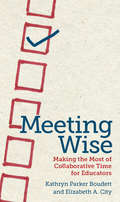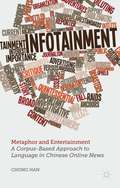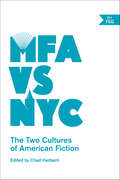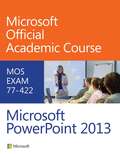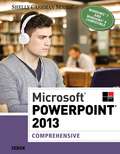- Table View
- List View
Media Analysis Techniques
by Dr Berger Arthur AIn the Fifth Edition of Media Analysis Techniques, author Arthur Asa Berger provides students with a clearly written, user-friendly, and hands-on guide to media criticism. He empowers readers to make their own analyses of the media rather than just accepting the interpretations of others. The book first examines four techniques of media interpretation—semiotic theory, Marxist theory, psychoanalytic theory, and sociological theory—that Berger considers critical for creative people to acknowledge if they are to understand how their creations translate to the real world. Application chapters then link popular culture to these four theories. Written in an accessible style that demystifies complex concepts, the book also includes a comprehensive glossary, study guides, and the author’s own illustrations.
Media and Communication Research Methods: An Introduction to Qualitative and Quantitative Approaches 3rd edition
by Arthur Asa BergerThe new edition combines insightful discussions of qualitative and quantitative media and communication research methods as it covers each topic thoroughly in a fun-to-read style. Ideal for beginning research students at both the graduate and undergraduate level, this proven book is clear, concise, and accompanied by just the right number of detailed examples, useful applications, and valuable exercises that are sure to get your students to want to understand, and master, media and communication research.
Media and Social Life (Electronic Media Research Series)
by Mary Beth Oliver Arthur A. RaneyOur use of media touches on almost all aspects of our social lives, be they friendships, parent-child relationships, emotional lives, or social stereotypes. How we understand ourselves and others is now largely dependent on how we perceive ourselves and others in media, how we interact with one another through mediated channels, and how we share, construct, and understand social issues via our mediated lives. This volume highlights cutting edge scholarship from preeminent scholars in media psychology that examines how media intersect with our social lives in three broad areas: media and the self; media and relationships; and social life in emerging media. The scholars in this volume not only provide insightful and up-to-date examinations of theorizing and research that informs our current understanding of the role of media in our social lives, but they also detail provocative and valuable roadmaps that will form that basis of future scholarship in this crucially important and rapidly evolving media landscape.
Media, Environment and the Network Society
by Alison G. AndersonThe news media has become a key arena for staging environmental conflicts. Through a range of illuminating examples ranging from climate change to oil spills, Media, Environment and the Network Society provides a timely and far-reaching analysis of the media politics of contemporary environmental debates.
Media Ethics: Issues And Cases, 8th Edition
by Philip Patterson Lee WilkinsMedia Ethics is a diverse, classroom tested compilation of 60 diverse cases that will help students prepare for the ethical situations they will confront in their media careers. Ninety percent of the cases are based on actual events, and authors from many institutions and media outlets contributed both real-life and hypothetical cases. There is a strong focus on ethical theory and practice throughout the book, which works well as both a main text in a media ethics course, and in an "across the curriculum" approach in other media courses.
Media Ethics: Key Principles for Responsible Practice
by Dr Patrick L. PlaisanceMedia Ethics: Key Principles for Responsible Practice makes ethics accessible and applicable to media practice, and explains key ethical principles and their application in print and broadcast journalism, public relations, advertising, marketing, and digital media. Unlike application-oriented casebooks, this text sets forth the philosophical underpinnings of key principles and explains how each should guide responsible media behavior. Author Patrick Lee Plaisance synthesizes classical and contemporary ethics in an accessible way to help students ask the right questions and develop their critical reasoning skills, as both media consumers and media professionals of the future. The Second Edition includes new examples and case studies, expanded coverage of digital media, and two new chapters that distinguish the three major frameworks of media ethics and explore the discipline across new media platforms, including blogs, new forms of digital journalism, and social networking sites.
Media Evolution On The Eve Of The Arab Spring
by Leila Hudson Adel Iskandar Mimi KirkMedia Evolution on the Eve of the Arab Spring brings together some of the most celebrated and respected names in Arab media research to reflect on the communication conditions that preceded and made the Arab uprisings possible.
The Media Handbook: A Complete Guide to Advertising Media Selection, Planning, Research, and Buying
by Helen KatzThe Media Handbook provides a practical introduction to the advertising media planning and buying process. Emphasizing basic calculations along with the practical realities of offering alternatives and evaluating the plan, this fifth edition reflects the critical changes in how media is planned, bought, and sold by today's industry professionals. Author Helen Katz looks at the larger marketing, advertising, and media objectives, and follows with an exploration of major media categories, including digital media. She provides a comprehensive analysis of planning and buying, with a continued focus on how those tactical elements tie back to the strategic aims of the brand and client. Also available is a Companion Website that expands The Media Handbook's content in an online forum. Here, students and instructors can find tools to enhance course studies such as chapter overviews, PowerPoint slides, and sample questions. With its emphasis on real-world industry practice, The Media Handbook provides an essential introduction to students in advertising, media planning, communication, and marketing. It serves as an indispensable reference for anyone pursuing a career in media planning, buying, and research.
Media in Egypt and Tunisia: From Control to Transition?
by Edward WebbThis book examines the mass media systems of Egypt and Tunisia under the pre-uprising regimes, with a focus on the last decade of the Mubarak and Ben Ali periods, as well as on how media are adapting to the political transitions underway. Findings are based on extensive interviews with journalists.
Media Messages: What Film, Television, and Popular Music Teach Us About Race, Class, Gender, and Sexual Orientation
by Linda Holtzman Leon SharpeThe new edition of this widely adopted book reveals how the popular media contribute to widespread myths and misunderstanding about cultural diversity. While focused on the impact of television, feature film, and popular music, the authors reach far beyond media to explore how our understanding, values, and beliefs about race, class, gender and sexual orientation are constructed. They analyze how personal histories, combined with the collective history of oppression and liberation, contribute to stereotypes and misinformation, as well as how personal engagement with media can impact prospects for individual and social freedom. Along with updated media examples, expanded theories and analysis, this edition explores even more deeply the coverage of race in two chapters, discusses more broadly how men and boys are depicted in the media and socialized, and how class issues have become even more visible since the Great Recession of the 21st century and the Occupy movements. Special activities and exercises are provided in the book and an online Instructor's Manual is available to adopters.
Media Systems And Communication Policies In Latin America
by Manuel Alejandro Guerrero Mireya Márquez-RamírezMedia Systems and Communication Policies in Latin America proposes, tests and analyses the liberal captured model. It explores to what extent to which globalisation, marketization, commercialism, regional bodies and the nation State redefine the media's role in Latin American societies.
Media Transformation: The Transfer of Media Characteristics Among Media (Palgrave Pivot)
by Lars ElleströmThis is a methodical study of the material, mental limit and possibilities of transferring information and media characteristics among dissimilar media. Ellestrom proposes a model for pinpointing the most vital conceptual entities and stages in intermedial transfers with different media that have common traits that enable systematic comparison.
The Media Welfare State: Nordic Media In The Digital Era
by Ole J. Mjøs Hallvard Moe Trine Syvertsen Gunn Sara EnliThe Media Welfare State: Nordic Media in the Digital Era comprehensively addresses the central dynamics of the digitalization of the media industry in the Nordic countries--Sweden, Norway, Denmark, Finland, and Iceland--and the ways media organizations there are transforming to address the new digital environment. Taking a comparative approach, the authors provide an overview of media institutions, content, use, and policy throughout the region, focusing on the impact of information and communication technology/internet and digitalization on the Nordic media sector. Illustrating the shifting media landscape the authors draw on a wide range of cases, including developments in the press, television, the public service media institutions, and telecommunication.
Mediating the Message in the 21st Century: A Media Sociology Perspective
by Stephen D. Reese Pamela J. ShoemakerHailed as one of the "most significant books of the twentieth century" by Journalism and Mass Communication Quarterly, Mediating the Message has long been an essential text for media effects scholars and students of media sociology. This new edition of the classic media sociology textbook now offers students a comprehensive, theoretical approach to media content in the twenty-first century, with an added focus on entertainment media and the Internet.
Mediation für Dummies (Für Dummies)
by Al Weckert Monika ObothGibt es in Ihrem Leben Konflikte - beruflich oder privat -, die Sie gern lösen würden, ohne gleich einen Anwalt zu konsultieren oder gar einen Prozess anzustrengen? Dann ist dieses Buch genau das richtige für Sie. Monika Oboth und Al Weckert informieren anhand von vielen Fallbeispielen über die Einsatzmöglichkeiten, Inhalte und Methoden von Mediation als Mittel zur außergerichtlichen Konfliktklärung. Ob bei Trennung, Scheidung oder Erbstreitigkeiten, bei Konflikten in der Schule oder im Beruf oder bei Streitigkeiten zwischen Vertragspartnern - dieses unbürokratische Verfahren ermöglicht es Konfliktparteien, selbst ihre Lösung zu finden. Die Autoren beschreiben die fünf Phasen der Mediation, die Gesprächstechniken und Frageformen, den Umgang mit Gefühlen sowie Eskalationen und zeigen, wie durch Gewaltfreie Kommunikation Verständigung erreicht werden kann. So erfahren Sie, was Sie bei einer Mediation erwartet. Für all jene, die sich als Mediator zusätzlich qualifizieren wollen - Lehrer, Sozialpädagogen, Therapeuten, Personalentwickler oder Juristen - beschreiben die Autoren das Profil und das Handwerkszeug von Mediatoren.
Mediatization of Politics
by Frank Esser Jesper Str�mb�ckThe first book-long analysis of the 'mediatization of politics', this volume aims to understand the transformations of the relationship between media and politics in recent decades, and explores how growing media autonomy, journalistic framing, media populism and new media technologies affect democratic processes.
Medienkommunikation in Bewegung
by Jeffrey Wimmer Maren HartmannIn heutigen Gesellschaften stehen soziale, informationelle und räumliche Mobilität und digitale Kommunikationsmedien in einem engen Zusammenhang. Medien werden dabei nicht nur immer mobiler, sondern die Menschen verwenden sie auch zunehmend zum Zwecke kommunikativer Mobilität. Die vielfältigen Dimensionen individueller wie gesellschaftlicher Mobilitäts- und Mobilisierungsprozesse werden aus einer kommunikations- und mediensoziologischen Perspektive sowohl theoretisch als auch empirisch verortet. Dabei werden die Erträge bisheriger Forschungsansätze kritisch reflektiert und ein Blick auf zukünftige Forschungsherausforderungen geworfen und damit neue Impulse für die Diskussion geliefert.
Medienmanagement und öffentliche Kommunikation: Der Einsatz von Medien in Unternehmensführung und Marketing
by Thomas BeckerWie setzt man Medien und Kommunikation ein, um unternehmerische Ziele zu erreichen? Das ist das Thema des Fachgebiets Medienmanagement. Im Medienmanagement unterscheidet man zwei Disziplinen: Medien und Kommunikation als Mittel der Unternehmensführung sowie Medien und Kommunikation als strategisches Instrument im Marketing. Beide Aspekte stellt das Lehrbuch Medienmanagement und öffentliche Kommunikation für Studium und Berufspraxis vor und dient damit als Kompass für die Anwendung erfolgreicher Unternehmenskommunikation.
Meeting the Language Challenges of NATO Operations
by Ian P. JonesAfter 40 years of Cold War, NATO found itself intervening in Bosnia-Herzegovina, Kosovo and Afghanistan, where the ability to communicate with local people was essential to the success of the missions. This book explains how the Alliance responded to this challenge so as to ensure that the missions did not fail through lack of understanding.
Meeting Wise: Making the Most of Collaborative Time for Educators
by Kathryn Parker Boudett Elizabeth A. CityThis book, by two editors of Data Wise: A Step-by-Step Guide to Using Assessment Results to Improve Teaching and Learning, attempts to bring about a fundamental shift in how educators think about the meetings we attend. They make the case that these gatherings are potentially the most important venue where adult and organizational learning can take place in schools, and that making more effective use of this time is the key to increasing student achievement. <p><p> In Meeting Wise, the authors show why meeting planning is a high-leverage strategy for changing how people work together in the service of school improvement. To this end, they have created a meeting-planning “checklist” to develop a common language for discussing and improving the quality of meetings. In addition, they provide guidelines for readers on “wise facilitating” and “wise participating,” and also include “top tips” and common dilemmas. <p> Simple, succinct, and practical, Meeting Wise is designed to be read and applied at every level of the educational enterprise: district leadership meetings with central office staff, charter-school management summits, principals’ meetings with teachers, professional development sessions, teacher-team meetings, and even teachers’ meetings with parents and students.
Meeting Wise: Making the Most of Collaborative Time for Educators
by Kathryn Parker Boudett Elizabeth A. CityThis book, by two editors of Data Wise: A Step-by-Step Guide to Using Assessment Results to Improve Teaching and Learning, attempts to bring about a fundamental shift in how educators think about the meetings we attend. They make the case that these gatherings are potentially the most important venue where adult and organizational learning can take place in schools, and that making more effective use of this time is the key to increasing student achievement. In Meeting Wise, the authors show why meeting planning is a high-leverage strategy for changing how people work together in the service of school improvement. To this end, they have created a meeting-planning &“checklist&” to develop a common language for discussing and improving the quality of meetings. In addition, they provide guidelines for readers on &“wise facilitating&” and &“wise participating,&” and also include &“top tips&” and common dilemmas. Simple, succinct, and practical, Meeting Wise is designed to be read and applied at every level of the educational enterprise: district leadership meetings with central office staff, charter-school management summits, principals&’ meetings with teachers, professional development sessions, teacher-team meetings, and even teachers&’ meetings with parents and students.
Metaphor and Entertainment
by Chong HanMetaphor and Entertainment presents the very first, large-scale exploration of metaphor in Chinese online entertainment news, one of the most vibrant and controversial news genres in contemporary China.
MFA vs NYC: The Two Cultures of American Fiction
by Chad HarbachWriters write—but what do they do for money?In a widely read essay entitled "MFA vs NYC," bestselling novelist Chad Harbach (The Art of Fielding) argued that the American literary scene has split into two cultures: New York publishing versus university MFA programs. This book brings together established writers, MFA professors and students, and New York editors, publicists, and agents to talk about these overlapping worlds, and the ways writers make (or fail to make) a living within them. Should you seek an advanced degree, or will workshops smother your style? Do you need to move to New York, or will the high cost of living undo you? What's worse—having a day job or not having health insurance? How do agents decide what to represent? Will Big Publishing survive? How has the rise of MFA programs affected American fiction? The expert contributors, including George Saunders, Elif Batuman, and Fredric Jameson, consider all these questions and more, with humor and rigor. MFA vs NYC is a must-read for aspiring writers, and for anyone interested in the present and future of American letters.
Microsoft Official Academic Course: Microsoft PowerPoint 2013
by John Wiley Sons Inc.The PowerPoint 2013 text is mapped to the PowerPoint 2013 certification exam objectives and is designed to re-enforce workforce skills. With this book students learn to create complex slide shows such as product plans, reports, and marketing materials.
Microsoft® PowerPoint® 2013: Comprehensive
by Susan L. SebokIntroduce your students to the latest that Microsoft Office has to offer with the new generation of Shelly Cashman Series books! For the past three decades, the Shelly Cashman Series has effectively introduced computer skills to millions of students. With MICROSOFT POWERPOINT 2013, we're continuing our history of innovation by enhancing our proven pedagogy to reflect the learning styles of today's students. In this text you'll find features that are specifically designed to engage students, improve retention, and prepare them for future success. Our trademark step-by-step, screen-by-screen approach now encourages students to expand their understanding of MICROSOFT POWERPOINT 2013 through experimentation, critical thought, and personalization. With these enhancements and more, the Shelly Cashman Series continues to deliver the most effective educational materials for you and your students.
